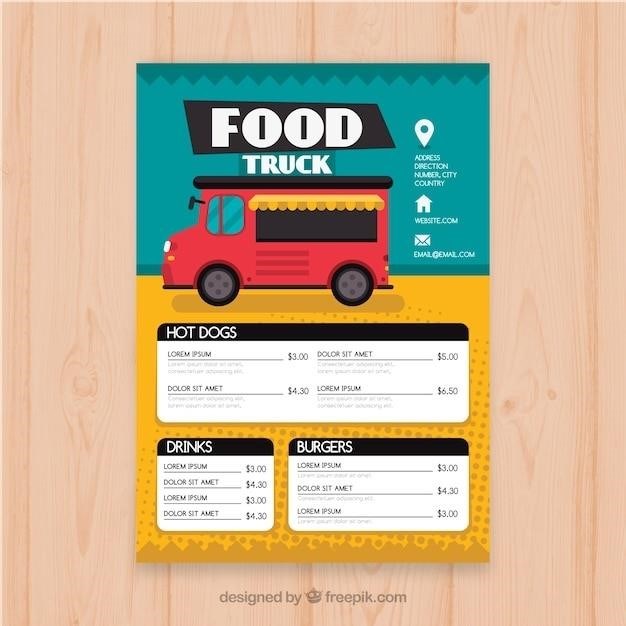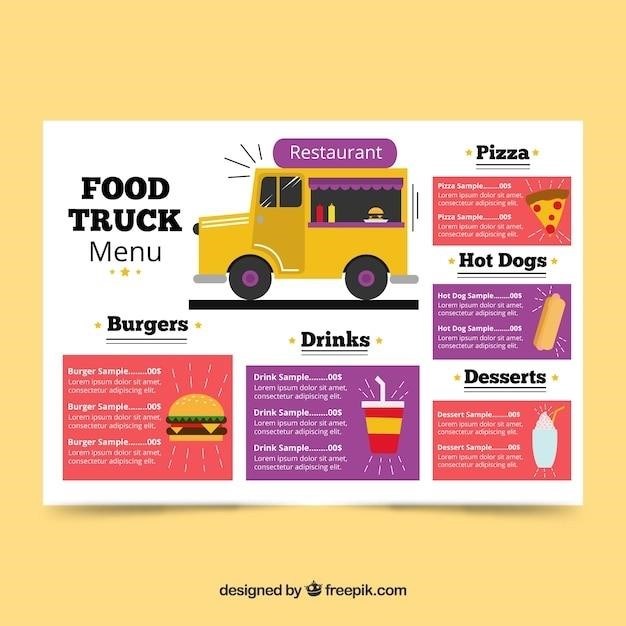
Food Truck Requirements in Illinois
Starting a food truck business in Illinois requires navigating various licenses, permits, and regulations․ This comprehensive guide outlines the essential steps to ensure your food truck operates legally and successfully in the state․
Introduction
The allure of food trucks is undeniable, offering a unique blend of culinary creativity, mobility, and convenience․ In Illinois, the food truck scene is thriving, with a growing number of entrepreneurs seeking to capitalize on this trend․ However, launching a food truck business in the state requires a thorough understanding of the regulations and requirements that govern mobile food vendors․ This comprehensive guide serves as a roadmap for aspiring food truck operators, outlining the essential steps, licenses, permits, and considerations necessary to establish a successful and compliant food truck operation in Illinois․ From navigating the Illinois Food Code and obtaining necessary licenses to meeting zoning regulations and commissary requirements, this guide provides a comprehensive overview of the legal framework surrounding food trucks in the state․ Whether you’re a seasoned chef or a culinary enthusiast looking to embark on a new venture, understanding these requirements is crucial for a smooth and successful journey in the world of Illinois food trucks․

Illinois Food Code
The Illinois Food Code serves as the foundation for food safety regulations throughout the state, including those governing food trucks․ This comprehensive set of rules and regulations outlines the standards for food handling, preparation, storage, and sanitation, ensuring public health and safety․ The code applies to all food establishments, including mobile units, and is enforced by local health departments․ Key aspects of the Illinois Food Code relevant to food trucks include⁚
- Food Handling and Preparation⁚ The code mandates proper food handling techniques, including temperature control, cross-contamination prevention, and employee hygiene․
- Storage and Refrigeration⁚ Food trucks must comply with specific requirements for storing and refrigerating food items to maintain their safety and quality․
- Equipment and Facilities⁚ The code outlines standards for the construction, maintenance, and sanitation of food trucks, including handwashing facilities, equipment cleaning, and waste disposal․
- Licensing and Permits⁚ The Illinois Food Code requires food trucks to obtain the necessary licenses and permits from local health departments, ensuring compliance with food safety regulations․

Understanding and adhering to the Illinois Food Code is critical for food truck operators to ensure public health, maintain a safe environment, and prevent legal issues․ The code is a valuable resource for operators seeking to establish a food truck business in Illinois, providing clear guidelines for operating a safe and compliant food establishment․
Mobile Food Dispenser and Preparer Licenses
Illinois has established two distinct licenses for food trucks⁚ the Mobile Food Dispenser (MFD) license and the Mobile Food Preparer (MFP) license․ These licenses define the scope of food preparation and service allowed within the food truck, impacting its operations and menu options․
- Mobile Food Dispenser (MFD)⁚ This license authorizes food trucks to prepare, cook, and sell food directly to consumers from the vehicle; Food trucks with an MFD license can offer a wider range of menu items, including freshly cooked dishes․
- Mobile Food Preparer (MFP)⁚ This license restricts food truck operations to serving pre-prepared, pre-packaged food items that were prepared in a licensed commercial kitchen․ Food trucks with an MFP license primarily focus on serving pre-made meals, snacks, or beverages that have been pre-packaged․
The specific requirements for obtaining each license, including application procedures, fees, and renewal processes, are outlined by the Illinois Department of Public Health (IDPH)․ Food truck operators must carefully consider the type of license that aligns with their business model and menu offerings, ensuring they meet the specific regulations associated with each license category․
Health Department Permits
Operating a food truck in Illinois mandates compliance with stringent health and safety regulations enforced by local health departments․ These departments play a crucial role in ensuring food safety and protecting public health․ Food truck owners must obtain a health department permit, which requires a comprehensive inspection process to ensure compliance with established standards․
- Food Truck Permit⁚ Each food truck must secure an annual health department food truck permit from the local health department with jurisdiction over the area where the majority of its operations take place․ This permit ensures that the food truck meets the minimum health and safety requirements․
- Commissary Agreement⁚ Food trucks operating in Illinois are required to have a commissary agreement with a licensed commercial kitchen․ This agreement outlines the arrangements for food preparation, storage, and sanitation․ The commissary kitchen must meet all health department regulations and provide a suitable space for food truck operators to handle their food preparation activities․
- Inspections⁚ The local health department conducts regular inspections of food trucks to ensure ongoing compliance with sanitation standards․ These inspections cover various aspects, including food handling practices, equipment maintenance, and overall cleanliness․ Failure to meet these standards can result in fines or even suspension of the food truck’s permit․
Business Licenses
Before hitting the road, food truck entrepreneurs in Illinois must secure the necessary business licenses to operate legally․ Obtaining these licenses ensures that your food truck business is registered with the state and local authorities, allowing you to conduct business in accordance with legal requirements․
- Mobile Food Dispenser (MFD) or Mobile Food Preparer (MFP) License⁚ These licenses are essential for food trucks and are issued by the Illinois Department of Public Health (IDPH)․ The MFD license is for food trucks that prepare and dispense food on-site, while the MFP license is for those that prepare food in a commissary and only dispense it from the truck․ The specific requirements for each license vary, but generally include information about the truck, its equipment, and the food truck operator․
- Business License⁚ Every food truck business needs a business license from the city or county where it operates․ This license verifies that your business is registered and operating legally within the local jurisdiction․ The application process often involves providing details about your business, including its name, address, and type of food service․
- Food Handler’s Permit⁚ All individuals handling food in a food truck must obtain a food handler’s permit․ This permit ensures that employees are trained in safe food handling practices, preventing foodborne illnesses and maintaining food safety standards․
Zoning Regulations
Zoning regulations play a crucial role in determining where food trucks can operate in Illinois․ These regulations vary significantly between cities and counties, making it essential for food truck operators to research and understand the specific rules in their area․
- Location Restrictions⁚ Many cities and counties have restrictions on where food trucks can operate, often limiting them to specific zones or prohibiting them from operating near certain types of businesses, such as brick-and-mortar restaurants․ These restrictions are designed to ensure fair competition and minimize potential disruptions to existing businesses․
- Time Limits⁚ Some jurisdictions may impose time limits on how long food trucks can operate in a particular location․ These limits are often designed to prevent food trucks from monopolizing a specific area or disrupting traffic flow․
- Parking Regulations⁚ Food trucks must comply with local parking regulations, ensuring they park safely and legally․ These regulations may include specific requirements for parking permits, designated parking areas, and restrictions on parking in certain areas, such as residential neighborhoods․
Food Truck Freedom Act
The Illinois Food Truck Freedom Act, enacted in 2021, aimed to create a more favorable environment for food truck businesses by streamlining regulations and reducing barriers to entry․ This act addresses several key areas⁚
- License Simplification⁚ The act prohibits local governments from requiring separate licenses, permits, or fees beyond an initial or reciprocal business license for food truck businesses․ This simplifies the licensing process and reduces unnecessary costs for food truck operators․
- Reciprocity⁚ The act promotes reciprocity between municipalities, allowing food trucks licensed in one location to operate in others without having to obtain additional licenses․ This fosters greater mobility and expands the reach of food trucks across the state․
- Zoning Flexibility⁚ The act encourages local governments to adopt flexible zoning regulations that promote food truck operations․ This includes allowing food trucks in a wider range of locations, such as public spaces and private properties․
Commissary Requirements
A commissary is a crucial component of operating a food truck in Illinois․ It serves as a central location for food preparation, storage, and cleaning․ The Illinois Food Code mandates that all food trucks must have a licensed and approved commissary to comply with food safety regulations․ Here’s what you need to know⁚
- Food Preparation and Storage⁚ Commissaries provide a clean and regulated environment for food preparation, cooking, and storage․ Food trucks cannot prepare food in residential homes or other unauthorized locations․
- Equipment and Facilities⁚ Commissaries must have adequate equipment and facilities for proper food handling, including sinks, refrigeration units, cooking appliances, and handwashing stations․
- Sanitation and Inspections⁚ Commissaries are subject to regular inspections by local health departments to ensure compliance with food safety standards․ Food truck operators must maintain records of their commissary agreement and any inspections;
- Shared Kitchen Options⁚ In addition to traditional commissaries, food trucks can also use shared kitchen facilities, which offer a cost-effective alternative for smaller businesses․
Fire Safety Permits
Fire safety is a paramount concern for food trucks, and Illinois requires operators to meet specific fire safety standards․ Depending on your location and the type of food truck operation, you may need to obtain a Fire Safety Permit․ Here’s what to expect⁚
- Fire Extinguishers⁚ Food trucks must be equipped with operable fire extinguishers that are regularly inspected and maintained․ The type and number of fire extinguishers will vary based on the truck’s size and equipment․
- Smoke Detectors⁚ Working smoke detectors are essential for early fire detection․ Ensure your truck has properly functioning smoke detectors installed in designated areas․
- Electrical Wiring⁚ Food trucks must have safe and properly installed electrical wiring to prevent electrical fires․ Have a qualified electrician inspect your truck’s electrical system․
- Ventilation⁚ Adequate ventilation is crucial to prevent the buildup of flammable gases from cooking operations․ Ensure your truck has appropriate ventilation systems for cooking areas and exhaust fans․
- Fire Safety Training⁚ Food truck operators and staff should receive fire safety training to understand proper procedures in case of a fire, including evacuation plans and the use of fire extinguishers․
Additional Considerations
Beyond the core requirements, certain additional factors can significantly impact your food truck operations in Illinois․ These considerations can influence your success and ensure compliance with local regulations․
- Insurance⁚ Obtain comprehensive liability insurance to protect your business from potential accidents, injuries, or property damage․ Specific types of insurance, such as commercial auto insurance, may also be required․
- Food Truck Association⁚ Consider joining the Illinois Food Truck Association for networking opportunities, advocacy, and access to valuable resources․ This association can provide insights into industry best practices and help you stay updated on legislative changes․
- Social Media Presence⁚ Establish a strong social media presence to engage with potential customers and promote your food truck․ Use platforms like Instagram and Facebook to showcase your menu, share updates, and build brand awareness․
- Customer Service⁚ Excellent customer service is essential for building a loyal customer base․ Train your staff to be friendly, efficient, and responsive to customer needs․
- Menu Planning⁚ Craft a diverse and appealing menu that caters to local preferences․ Consider offering seasonal specials and rotating items to keep your offerings fresh and interesting․